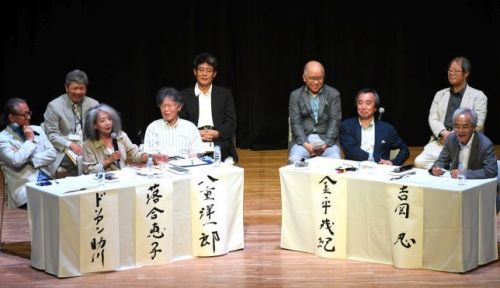Japan P.E.N. Club holds Day of Peace Symposium in Okinawa, speakers say Okinawa still feels anguish of war

On the afternoon of May 20 at the Okinawa Convention Center in Ginowan City, speakers exchange opinions on Okinawa and literature at the Japan P.E.N. Club's Day of Peace Gathering. (Photograph provided by Futoshi Hanashiro)
May 20, 2018 Ryukyu Shimpo
On May 20 the Japan P.E.N. Club held its 34th Day of Peace Symposium at the Okinawa Convention Center, which was themed “People, Island Life, Okinawa and Literature.”
Nine authors, poets, and journalists attended from outside of Okinawa, giving keynote speeches and holding a panel discussion.
Expressive persons in the realm of Okinawan literature that depicts military base issues and the Battle of Okinawa spoke together with the goals of conveying Okinawa’s suffering nationwide and brainstorming what literature can do for peace.
This is the first time this event was held in Okinawa. Eight hundred people attended and listened eagerly to the writers’ arguments.
Former president of the Japan P.E.N. Club and novelist Jiro Asada gave a keynote speech titled “How War and Literature are Considered in Okinawa.” Asada said, “Literature depicts the truths of human suffering.
Without suffering, literature cannot be born.
” He touched on Okinawa being at the mercy of military base issues with the words, ”
Even now, Okinawa is experiencing the prolonged anguish of war. Ironically, Okinawan literature emits radiant brilliance.”
Participating in the subsequent panel discussion were Asada; writers Shinobu Yoshioka, Keiko Ochiai and Dorian Sukegawa; literary critic Minato Kawamura; journalist Shigenori Kanehira; Okinawan writers Sadatoshi Oshiro and Eiki Matayoshi; and poet Yoichiro Yae.
Oshiro spoke about Okinawan literature that paints images of Okinawa, military base issues, and the like. He said, “[Okinawa] suffers damages from the bases, injury from the power of the state, and even when we [Okinawans] raise our voices we are depicted as weaklings.
This is why such literature is born in Okinawa.
I hope we pursue literature’s potential to ethically fight against authority, in correspondence with the times and circumstances.”
Matayoshi said, “U.S. military bases are causing various problems throughout the world.
Okinawan literature is universally relevant in that it depicts Okinawan people’s tyrannization by the bases.”
Kawamura said, “In the several decades of the postwar period, Okinawa has continued to be controlled by the U.S. military, and is still tormented by bases that have not been even slightly diminished since Okinawa’s return [to Japan]. As such, Okinawan literature has the power to change Japanese literature, and I especially want mainland people to read it.
(English translation by T&CT and Erin Jones)
Previous Article:Onaga announces plan to resume work following removal of cancerous tumor
Next Article:Assembly held in Naha to kick of petition demanding Henoko landfill be put to Okinawan resident vote
[Similar Articles]
- Okinawa Governor Onaga signals cancellation of Henoko landfill approval
- At external affairs symposium, former Kwansei Gakuin University professor Narahiko Toyoshita and others discuss Okinawa as cornerstone of disarmament
- Protest gathering to body-dumping incident calls for withdrawal of all US bases from Okinawa
- Discussion about Okinawa under U.S. military occupation held at Brazil
- Symposium commemorating the designation of the Kerama Islands as a national park
 Webcam(Kokusai Street)
Webcam(Kokusai Street)


